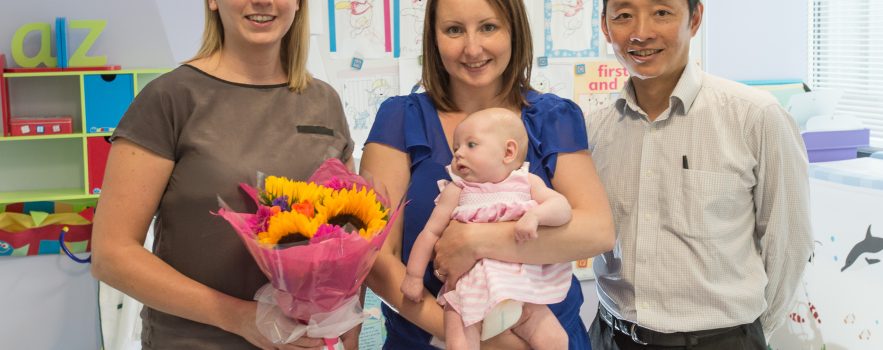On Thursday 10th July 2014 researchers from the University of Cambridge welcomed Jessica and her mother as she became the 500th participant in the Baby Milk study at the Medical Research Council (MRC) Epidemiology Unit on the Cambridge Biomedical Campus.
Dr Ken Ong, paediatrician and programme leader at the MRC Epidemiology Unit noted that:
The recruitment of the 500th participant is a major milestone for the Baby Milk study, which seeks to improve our understanding of infant feeding, appetite, behaviour and growth, and inform future infant feeding guidelines.”
How babies are fed and grow during the first year of life can have important effects on their health in later life. While exclusive breastfeeding is recommended for around the first six months of a baby’s life, this is not possible for all mothers, so many babies receive formula milk feeds, either exclusively or in combination with breast feeding.
The aim of the study is to evaluate a package of support for parents who are bottle-feeding, as previous studies by the team have shown that many parents who give their babies formula-milk are asking for more information and support. Researchers at the Centre for Diet and Activity Research (CEDAR) and MRC Epidemiology Unit in Cambridge have developed a new feeding programme consisting of three components: (1) a motivational component to strengthen parents’ motivation to follow the Baby Milk feeding guidelines, (2) an action planning component to help translate motivation into action; and (3) a coping planning component to help parents cope with difficult situations (e.g. a crying baby).
On enrolment parents receive either the new feeding programme or standard advice about bottle-feeding and weaning, and both sets of parents and babies have regular face-to-face and phone meetings with trailed facilitators so that any effect can be attributed to the intervention and not just the extra attention. Babies and parents in the study are measured at the start of the study, at six months and at 12 months. Measures include baby’s length, weight and head circumference, as well as questionnaires about their sleep, appetite and temperament.
Chief Investigator Dr Raj Lakshman encouraged more babies and their parents to join the study in order to help them meet their target of 700 participants, commenting:
“In order to determine if our new feeding programme has a beneficial effect on growth and development during the first year of an infant’s life, we need to recruit another 200 babies and mothers to the study by March 2015. Taking part in our study is a great way for new parents to get help and support, while helping to ensure that babies born in years to come get the best possible start in life. If you live in Cambridgeshire, and your baby is less than three months old and is receiving some formula-milk feeds (which can be in combination with breastfeeding), we would love to hear from you.”
For information about participating in the Baby Milk study:
- https://www.mrc-epid.cam.ac.uk/research/studies/babymilk/
- Email: babymilkstudy@mrc-epid.cam.ac.uk.
- Telephone: 0800 7560878
Notes:
The Baby Milk Study is supported by the National Prevention Research Initiative Grant Reference MR/J000361/
International Standard Randomised Controlled Trial Number Register: http://www.controlled-trials.com/ISRCTN20814693

 MRC Epidemiology Unit
MRC Epidemiology Unit